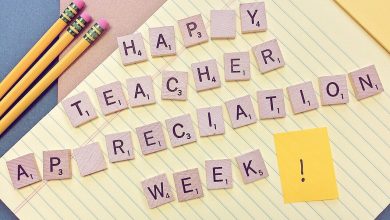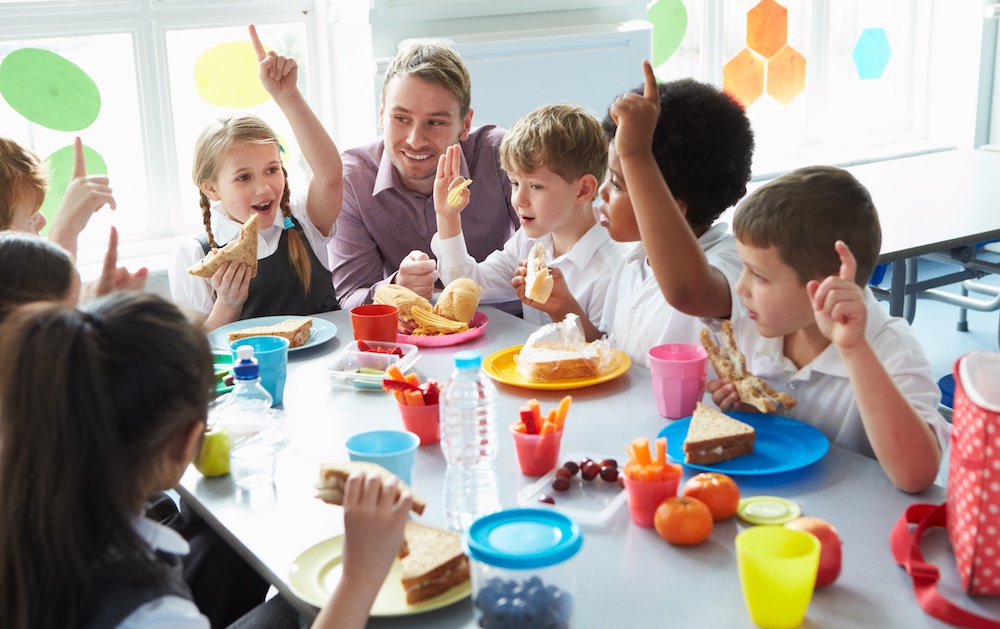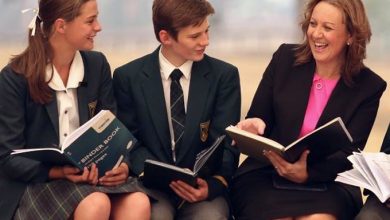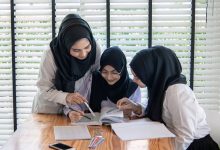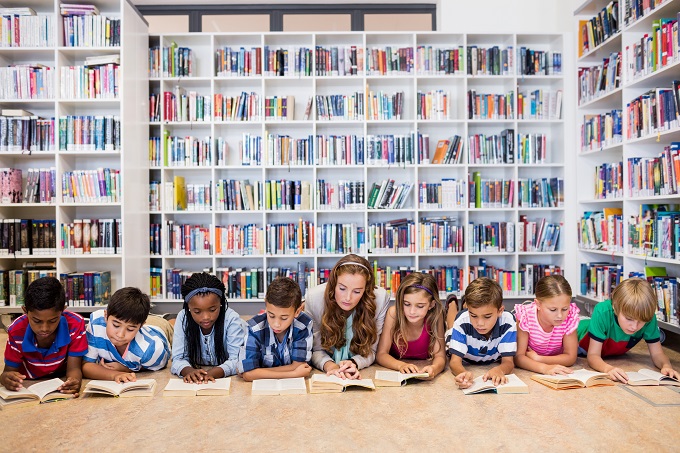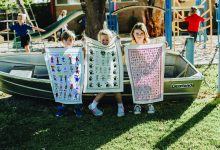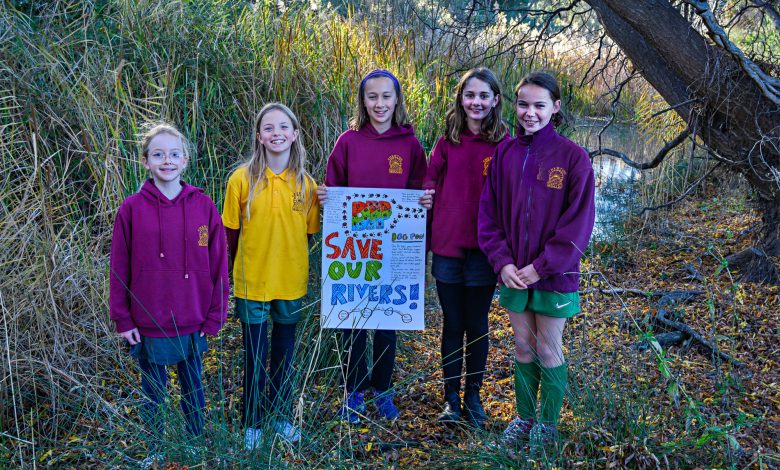
Located five kilometres east of Castlemaine, Chewton Primary School enjoys a stunning bush setting. A music garden, outdoor stage, cubby building area, wood-fired oven and interpretive play space complement the classrooms. Special events and celebrations are marked with cook ups around the fire, with food prepared using produce from the school gardens. Alongside their curriculum learning, students are taught to value and respect this special location and are keen to improve and preserve it.
Read the latest print edition of School News HERE
The school’s sustainability efforts saw Chewton Primary School claim the title of Resource Smart School of the Year in 2024 and win a Resource Smart Curriculum Leadership Award in 2023. Recognising that sustainability is linked to understanding First Nations perspectives, the school developed a Reconciliation Action Plan which was nominated for a National Reconciliation Award.
Principal Bernadette McKenna said many of the initiatives undertaken at Chewton Primary School are about celebrating. “The key work we do is empowering children to make positive change in their local community,” Bernadette — as she is known to the school community — said. “It’s recognising where we are celebrating First Nations culture, learning about Country and protecting it.”
The school’s sustainability journey started with Resource Smart Schools, a Victorian Government initiative. The program has a series of modules which participating schools must complete, including waste, energy, water and biodiversity. The school has a sustainability teacher on staff one day per week, who works with every class and helps students to focus on the core modules.
“Each class assumed responsibility for one of those modules,” Bernadette explained. “They had to learn about it, but they also had to run the learning for the whole school. I think what happens in a lot of schools is the sustainability is run through the Year 5 and 6 classes, but we wanted to embed it right across the school.”
Finding practical applications for learning within each module makes it more accessible to students. “We looked at what needed to be done in our environment. We’re really lucky that our school is surrounded by bush. But it’s on goldfields country, so the land has been damaged a lot by gold seeking,” Bernadette said. “There’s a lot of work to do in terms of restoring the land.”
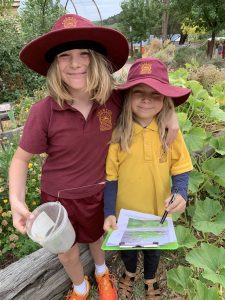
Chewton Primary School works with local Landcare group Post Office Hill Action Group. Together, the school and Landcare have undertaken revegetation in the bush behind the school. “The kids plant the trees, but they also go and water in, and then care for it all. That’s ongoing work that we do.”
Connecting Country has also been involved in the school’s sustainability journey, running a series of workshops over the past several years. “They did a reptile count with the Preps and Year 1s which was really lovely,” Bernadette said. “We’ve also got a nesting box programme which Connecting Country helps to run, and they also incorporate a First Nations cultural component and teach the students about biodiversity.”
More than just extra initiatives or lunchtime projects, sustainability is embedded into the curriculum at Chewton Primary School. “Our curriculum leaders have mapped where sustainability fits across the Victorian curriculum,” Bernadette said. “For instance, last term we had a whole school focus on endangered animals. The children had to do individual research, talk about an endangered animal, and looked at habitat. It was quite fascinating!”
Integral to sustainability efforts, Bernadette said, is considering and incorporating First Nations perspectives. Chewton Primary School is on Djaara Country, and works hard to build connections with Djaara and other First Nations people living in the community. “Our Koori Engagement Support Officer, (KESO), is Aunty Kerri Douglas, who is a Djaara Elder, and she’s also a primary teacher. She does a lot of work with our staff on planning and offers guidance on curriculum resources they can use in their teaching.”
The school also works closely with Nalderun Aboriginal Education Corporation, connecting with Djaara Elder Uncle Rick. A range of First Nations people visit the classrooms to talk to children throughout the year, teaching culture. “We also place a really high importance on all of our children having access to learning about Country on Country. The kids can tell you what Bunjil’s teachings are: for care for self, care for Country and care for others.
“We don’t see Indigenous perspectives as separate to sustainability, we see it as part of the same work,” Bernadette said.
Extending their First Nations connections with the broader community, in 2022 Chewton Primary School established a Reconciliation Walk. Exploring the theme for Reconciliation Week that year, Be Brave and Make Change, students across every classroom participated in four weeks of activities. “We approach Reconciliation Week as a month of learning rather than a week of feel-good activities,” Bernadette said.
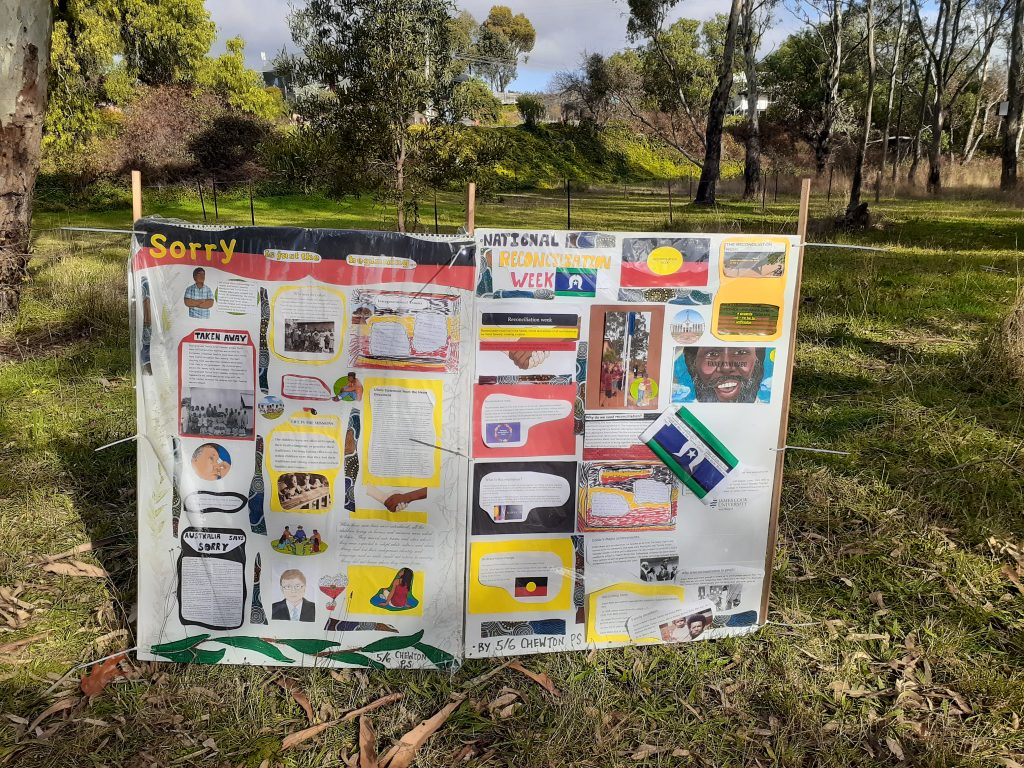
Students applied their knowledge, making storyboards to showcase their learning. These were set up along Forest Creek, the route for the walk, for students, families and other visitors to engage with. This year, the Reconciliation Walk grew, with more than 250 children from other schools joining the Chewton Primary School community.
All staff at the school have done work on Indigenous world views and are encouraged to incorporate First Nations pedagogy and process within their teaching. “We recognise we’re really just beginning there, and it’s work we’re really fascinated about in terms of how we bring that into our teaching and learning in the classroom.”
Chewton Primary School students are encouraged to connect with the local community and share their knowledge. Students’ confidence and understanding of their learning is demonstrated through student-led projects, including the muesli bar project and the dog poop project.
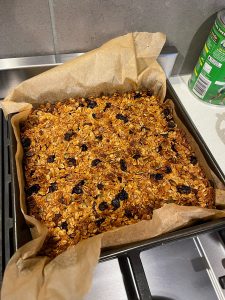
“We know that soft plastic is the biggest waste issue, and now there is limited availability for recycling soft plastics,” Bernadette explained. To help raise awareness for this issue and combat it, working with parents, a group of students from within the student council – known as the Green Team – are making and selling muesli slices to the school community.
“We’re trying to make them cost effective so they don’t cost more than what you could purchase in the supermarket. We’ve still got a way to go because of the convenience for parents of just picking up stuff from the supermarket shelves. From our surveys we are seeing that people are significantly reducing the amount of soft plastic, which is great.”
The Dog Poop project spawned from the students’ involvement in the River Detectives programme. “They went down to the creek one day for testing, and they couldn’t believe how much dog poo was everywhere,” Bernadette said. Many people have their dog off the lead and there are no bins in the area. “The children came back and researched what dog poo does to the waterways.”
Following some scientific research, the students formed a group called the Dog Poop Protest. The group contacted Parks Victoria who manage the area and asked them if they could put up some signs. After discussions, Parks Victoria have agreed to put up some signs, including a printed poster designed by the students.
“The students are fundraising as well. They have tins in four different locations in Chewton so they can purchase some biodegradable dog poop bags,” Bernadette said.
“When I see that student led work around sustainability, it shows that we’ve got really strong foundational learning in science, but also linking in with how we can make a real difference locally.”
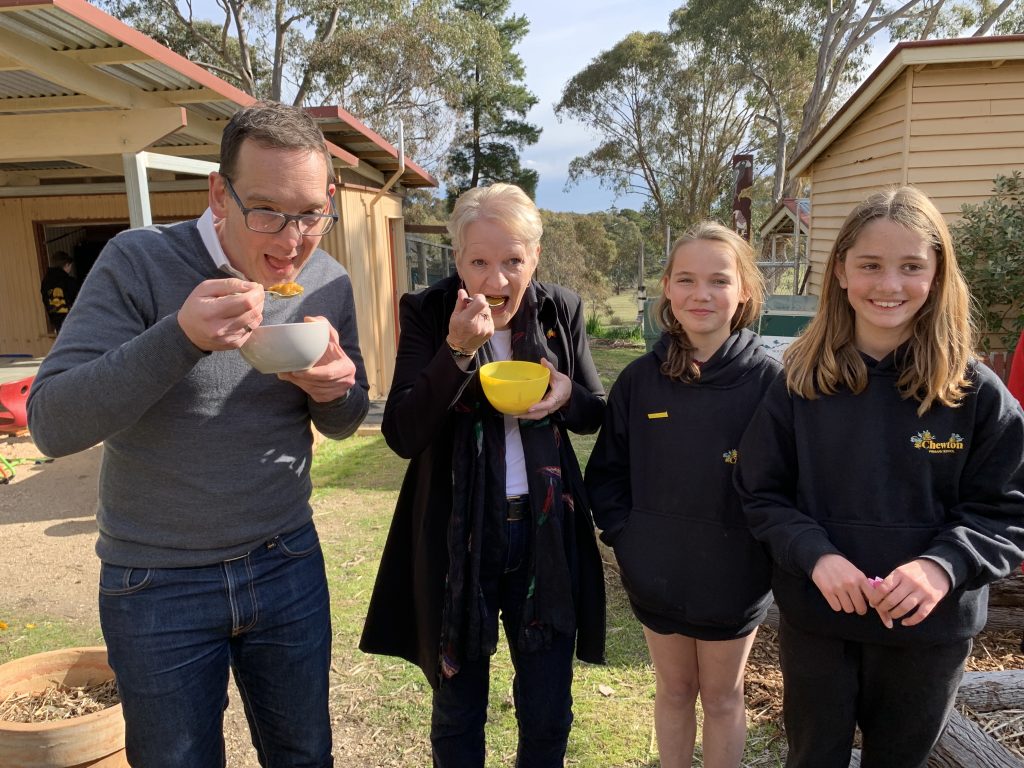
Recently, Minister for Environment, Steve Dimopoulos and local member Maree Edwards visited the school. Students shared some pumpkin soup with the minister, made from produce from their vegetable garden. Small groups of students shared information from the storyboards showcasing the sustainability initiatives. “They were so proud of themselves,” Bernadette said. “You could hear it in how clear they were verbalising their learning and what they were doing. It’s fantastic to see that sense of pride in what they do.”
Beyond explicit learning and teaching, Bernadette hopes that Chewton Primary School students develop a sense of pride in their work and their community. “We recognise how lucky we are to live in this beautiful environment, and we want to do the best we can.
“Dja Dja Wurrung people call this area upside down country because it’s literally been picked up and turned upside down during the gold rush. I think we have a really strong connection to so many elements of history here, and I think the children have a strong sense of how important it is for them to look after Country, and to try and help it as well. “I have such gratitude for where we are and for being able to have those connections.”


